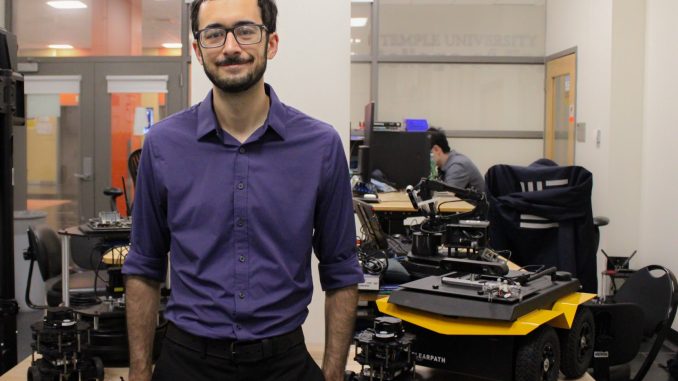
After applying for the National Science Foundation’s Faculty Early Career Development Program twice before, Philip Dames used the feedback he received to write his 15-page written research proposal for his third and final application. He had to wait nine months to learn if his research ideas were deemed fundable by robotics experts, a wait that felt especially long since it would be his last opportunity to apply.
In April 2022, Dames, an assistant mechanical engineering professor, was notified that he won a more than $550,000 monetary prize through the CAREER program to fund his research on robotic coordination. The CAREER award is open to newly-established professors who also incorporate research into their teaching.
Dames’ proposal was voted on by a panel of robotic experts who believed his proposal for the main two criteria of the award, including high intellectual merit and societal impact.
“Getting one of these awards often can mean the research community that you are a part of believes that you have good ideas, and they want to fund you for five years to do work,” Dames said.
Philip Dames applied for the National Science Foundation’s annual Faculty Early Career Development Program for the third time last July – an award that has an individual lifetime restriction of three applications.
The first part of Dames’ research will occur in the Temple Robotics and Artificial Intelligence Laboratory, where they will create computer simulations to study hypothetical scenarios and conducting literature review, Dames said.
Another component of Dames’ research uses statistical methods inspired by advanced sports analytics to calculate what characteristics or skills individual robots will add toward their team’s abilities.
Pujie Xin, a third-year mechanical engineering Ph.D. student, is helping Dames with the research on multi-robot systems by helping co-develop computer simulations and conducting literature review by studying and summarizing existing research.
“For a new Ph.D. student here, I’m able to get in touch with the frontier topics, which is listed by Dr. Dames, and then I’m able to select one of the most interesting topics and select one.” Xin said
Due to the challenges researchers face with having robots outside of a controlled lab setting, Dames has not seen multi-robot coordination implemented in real-world situations, he said.
“When you’re outside in the real world, like there’s new stuff, there’s weird stuff, there’s weather, there’s different lighting conditions involved, all sorts of stuff that make it hard, and the robots have to understand what’s going on and how that might affect them,” Dames said.
Over the course of the research, Dames wants to create mathematical and software tools to see robotic coordination happen outside a lab, he said.
“Hopefully during the course of working on this project, I’ll find ten more things that are really interesting, different directions I could go in, in the future,” Dames said. “That’s some of the fun and exciting things about research.”
John Helferty, associate professor of electrical and computer engineering, and Dames’ co-advisor of Temple Robotics, believes this award validates Dames’ work, knowledge and expertise and is happy to see him pursuing this area of research, he said.
“This area of autonomous coordination of multiple robotic platforms is really pushing the edge and I’m very happy to see that he’s right there,” Helferty said. “Temple’s very fortunate to have him for this area.”
Dames hopes that he can test his research outside and with actual robots but will have to see how the computer simulation research goes first, he said.
“Toward the end of the project, once we have some new research strategies, we would like to do some hardware testing with actual robots,” Dames said.


Be the first to comment